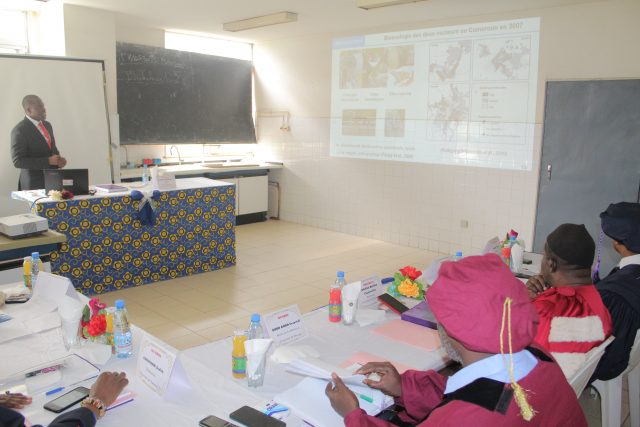
The candidate rendering his work
On December 8, 2022, Tedjou Armel PhD student at CRID, defended his PhD thesis at the University of Yaoundé I with distinction on the topic: Analysis of the entomological risk of emergence of massive epidemics of arboviral diseases (dengue, chikungunya and Zika) in Cameroon. The work was supervised by Prof. Njiokou Flobert (University of Yaoundé I) and Prof. Wondji Charles Sinclair (Liverpool School of Tropical Medicine) and done under the project Wellcome Trust training fellowship of Dr Basile Kamgang at CRID. The objectives of this work were to characterise the populations of Aedes aegypti and Ae. albopictus and to evaluate the entomological risk of the emergence of massive epidemics of arboviruses (dengue, Zika, and chikungunya) in Cameroon. This assessment was carried out at a macro-and micro-geographic scale based on bio-ecological and genetic characteristics, as well as estimating of Stegomyian indices for epidemics evaluation risk.
An assessment of the distribution of the two species revealed an overall predominance of Ae. albopictus over Ae. aegypti. Ae. aegypti is present in all the locations sampled, while Ae. albopictus is restricted to the southern part of the country, below 6°.4 North. Furthermore, in sympatric locations, the invasive species Ae. albopictus predominates over the native species Ae. aegypti, except in medium-high temperature environments. In Yaoundé, the capital city of Cameroon, the spatial distribution showed that, Ae. albopictus is more predominant than Ae. aegypti in peri-urban and urban environments while Ae. aegypti is predominant in rural areas. Discarded containers and used tyres were mainly found larval habitats and the presence of plant debris inside is strongly associated with the presence of immature stages of Aedes. The stegomyian indices establish a high potential risk of dengue or yellow fever epidemics in the city of Yaoundé.
Analysis of the blood meal-residue confirmed that humans remain the preferred host of both species, although it is possible for Ae. albopictus females to feed on other vertebrates such as bats and non-human primates. This possibility for Ae. albopictus to feed on animal hosts represents an epidemiological risk due to a likely transition of zoonotic pathogens from sylvatic to urban cycles. Mitochondrial DNA analysis in Ae. albopictus revealed low genetic diversity supporting the hypothesis of a recent introduction of this species in Cameroon and their multiple origins, from other tropical regions of the world.
Genetic analysis of Ae. aegypti populations revealed high polymorphism in immune genes with moderate positive selection for the PIAS gene. Moreover, results show that these genes studied in Ae. aegypti are expanding, highlighting the need of developing in-depth studies on the involvement of these genes in the transmission of dengue, chikungunya, and Zika viruses in Cameroon.
Nonetheless, these results point to a potential risk of the emergence of a massive epidemic of dengue, chikungunya, or Zika in Cameroon. After presenting his work in front of the jury, members of the jury unanimously awarded him a doctorate in Parasitology and Ecology.
Congratulations! Dr. Tedjou Amel for joining the rank of experts and doctors trained at CRID.






